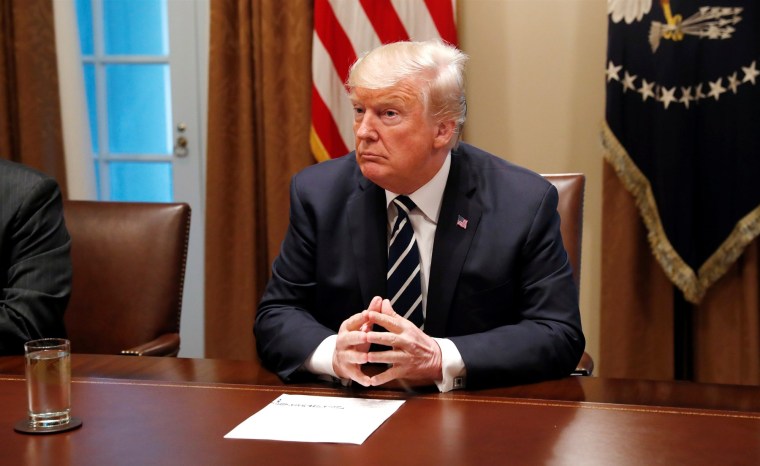Donald Trump was in Orlando on Monday, where he addressed the International Association of Chiefs of Police and tried to turn the event into a political rally of sorts, assuming that the law-enforcement officials were his political allies.
Referring to the completed fight over Brett Kavanaugh's Supreme Court confirmation, the president told the chiefs, "It was a disgraceful situation brought about by people that are evil." The president didn't specify whether he was referring to Democrats, the women who accused the justice of sexual assault, or both, though he was clearly referencing Americans.
During a brief Q&A with reporters yesterday on the White House South Lawn, Trump fielded a question on his choice of words.
Q: Mr. President, what about your comments yesterday that some of these forces against Brett Kavanaugh were, quote, "evil"?TRUMP: Yeah, I think they were. I think they were. Yeah.... I know many. I know fellow Americans that are evil. I know -- are you saying we shouldn't say that a fellow American is "evil"? I've known some fellow Americans that are pretty evil.
It's a subject the president apparently feels so strongly about, he keeps using the word. Two weeks ago, during a press conference, Trump insisted that the criticisms of Kavanaugh were "being perpetuated by some very evil people -- some of them are Democrats, I must say."
A week later, Trump told an audience at a Mississippi rally, in reference to Kavanaugh's critics, "These are really evil people." The president then repeated the line this week, after Kavanaugh had already been sworn in.
Back in July, Sen. Cory Booker (D-N.J.) urged senators not to be "complicit" in "evil" by confirming Kavanaugh. Months later, Kavanaugh told senators, "A Democratic senator on this committee publicly referred to me as evil. 'Evil.' Think about that word."
Trump has thought about it -- and he seems to love it.
As regular readers may recall, in September 2016, Hillary Clinton delivered remarks in which she took aim at Trump’s radicalized base. To be “grossly generalistic,” she said, “you could put half of Trump’s supporters into what I call the ‘basket of deplorables.’”
More specifically, Clinton lamented the fact that so much of Trump’s core support is “racist, sexist, homophobic, xenophobic, [and] Islamaphobic” – an assessment that’s stood up pretty well to further scrutiny.
Nevertheless, Republicans became a little obsessed with the line, and the media soon followed. I'll confess that I never fully understood why this became a furious point of contention, but the conventional wisdom said Clinton had crossed a line: criticizing a rival candidate is fine, but criticizing Americans, even bigoted Americans, is beyond the pale for someone seeking the nation's highest office.
And yet, here we are, two years later, watching Donald Trump repeatedly throw around the word "evil." He's not talking about mass murderers or people who peddle heroin to kids; the president wants the public to see his political rivals as "evil."
We've all grown accustomed to Trump using irresponsible rhetoric during extended tantrums, and much of the public has probably learned to roll their eyes and tune him out. But when a leader with authoritarian instincts repeatedly tells his followers that they should see his domestic opponents as wicked, I think it's a mistake to simply look the other way.
